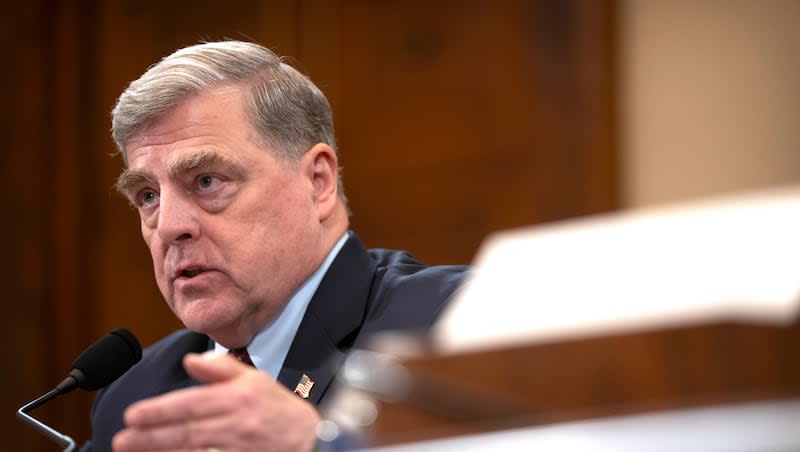These military leaders advised Biden against withdrawing U.S. troops from Afghanistan. What are they saying now?

- Oops!Something went wrong.Please try again later.
Military leaders who advised President Joe Biden against the 2021 withdrawal from Afghanistan testified about it before Congress on Tuesday for the first time since their retirements.
Former Joint Chiefs of Staff Chair Gen. Mark Milley and former U.S. Central Command Commander Gen. Kenneth McKenzie took questions from members of the House of Representatives at a hearing attended by family members of U.S. service members who died during the withdrawal.
Milley and McKenzie gave “dire” warnings of the consequences of leaving Afghanistan without better planning, and Biden ignored them, House Foreign Affairs Committee Chair Michael McCaul, R-Texas, said prior to questioning.
“If you fail to plan, you plan to fail,” he said. “And fail they did.”
The retired generals faced tough questions from members of the Foreign Affairs Committee on the withdrawal, what happened prior and who was culpable.
A chaotic withdrawal
Biden’s decision to withdraw troops from Afghanistan after a 20-year war there put Americans and Afghan allies in danger and embarrassed the U.S., McCaul said during opening remarks.
Biden’s choice also “dented perceptions” of his competence on foreign affairs, according to BBC.
During questioning, both Milley and McKenzie criticized the State Department response to what was playing out on the ground during the controversial withdrawal. The State Department ordered a “noncombatant evacuation operation” for U.S. citizens in Afghanistan too late, both said.
“It is my assessment that that came too late,” Milley said.
Milley said the Biden administration’s recommendation from the military was to evacuate U.S. Embassy workers when the military withdrew. There were warning signs long before the State Department issued the Aug. 14, 2021, noncombatant evacuation operations that Americans in Afghanistan could face danger, he said. Instead, Biden decided to leave the U.S. Embassy in Kabul open while withdrawing the military, “setting conditions for security to crumble with Americans still in harm’s way,” The Washington Post reported.
During fallout from the withdrawal, Biden made statements that contradict Milley’s recounting of events, according to BBC. Biden said generals never advised him to leave 2,500 troops at the Bagram airbase in Afghanistan. Milley said he advised Biden “to maintain a stay behind force.”
“The more I listen to this hearing, the more infuriated I get,” Rep. Mike Waltz, R-Fla., said.
Looking back on the Afghanistan operation as a whole, Milley called it a “strategic failure.” He added the military did its job and what was asked of it.
The Kabul airport attack
Gold Star families of the 13 U.S. service members killed in the Aug. 26, 2021, Kabul airport suicide bombing attended the committee hearing. The Abbey Gate attack was an oft-mentioned topic during the hearing, with McKenzie blaming policy decisions for the “tragedy.”
“It remains my opinion that if there was culpability in this attack, it lies in policy decisions that created the environment of August 2021 in Kabul,” he said. “Culpability and responsibility do not lie with the troops on the ground, who performed magnificently.”
McCaul has called for accountability for the Biden administration relating to the Afghanistan withdrawal and Abbey Gate for a while now, according to CNN.
“The blast also killed scores of Afghan civilians who were desperate to get into the walled-off airport complex,” CNN’s report said.
Biden’s foreign policy
Rep. Joe Wilson, R-S.C., lambasted Biden’s withdrawal decision during questioning, calling it a precursor to other Biden administration decisions that have enabled U.S. enemies abroad. Wilson said the withdrawal made the invasion of Ukraine, the Oct. 7 attack on Israel and China’s military build up in regards to Taiwan more likely.
Biden’s decisions on Afghanistan betrayed American military members and has damaged the nation’s credibility as a world leader, said Rep. Ann Wagner, R-Mo. The world is much more dangerous and unstable, with conflict roiling on every corner of the globe, she said.
The hearing’s topic “puts Democrats in an uncomfortable election-year position,” according to The Washington Post. Biden has defended his decision making in regards to Afghanistan often, so while some Democratic committee members made small critiques of the evacuation, they’re “under pressure” to rally around Biden.
Trump and Afghanistan
Former President Donald Trump’s 2020 Doha Agreement with the Taliban came up often during the hearing, primarily from Congressional Democrats who sought to point out Trump’s role in the chaos of Afghanistan. Foreign Affairs Committee Ranking Member Rep. Gregory Meeks, D-N.Y., said the agreement “empowered the Taliban at the expense of the Afghan government.”
Both Milley and McKenzie said that the Taliban repeatedly violated terms of the Doha Agreement other than the part about directly attacking U.S. military. Violations of the agreement were further reason for the Trump and Biden administrations to be cautious about removing U.S. troops from Afghanistan, they said.

